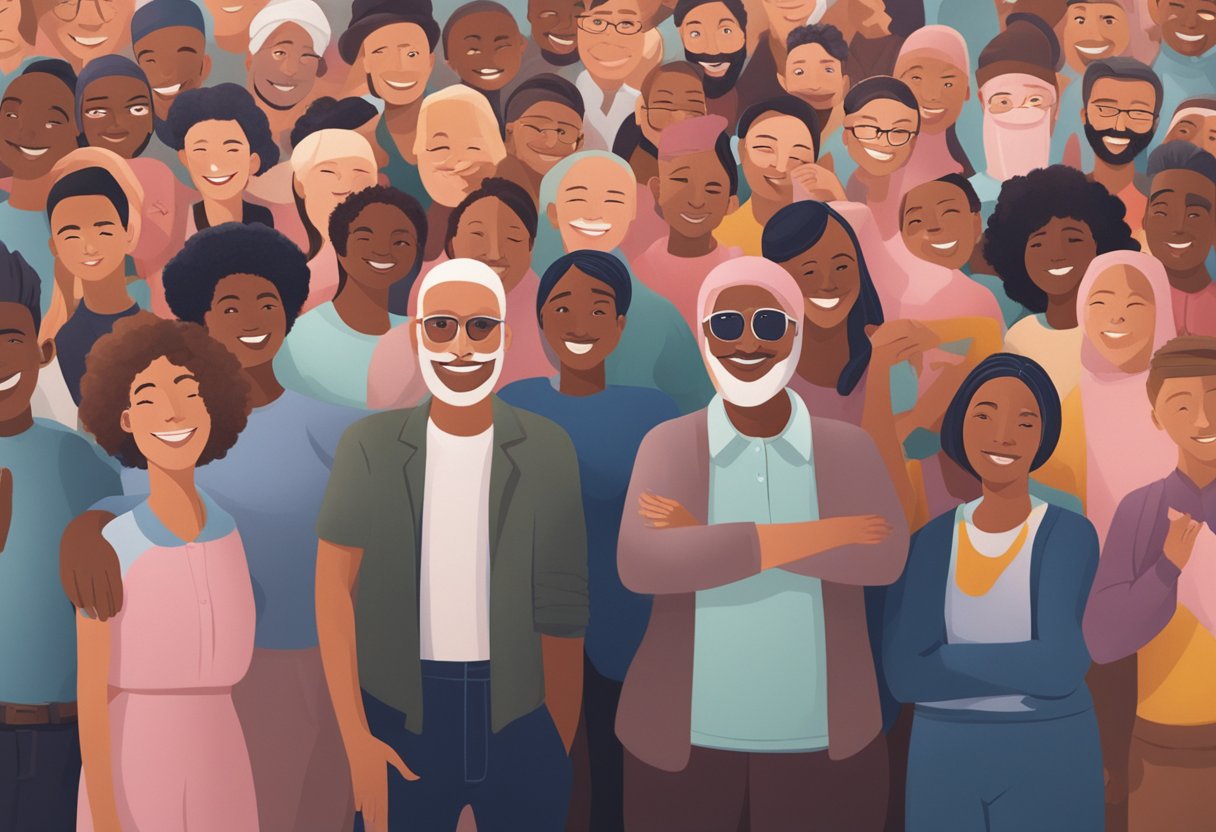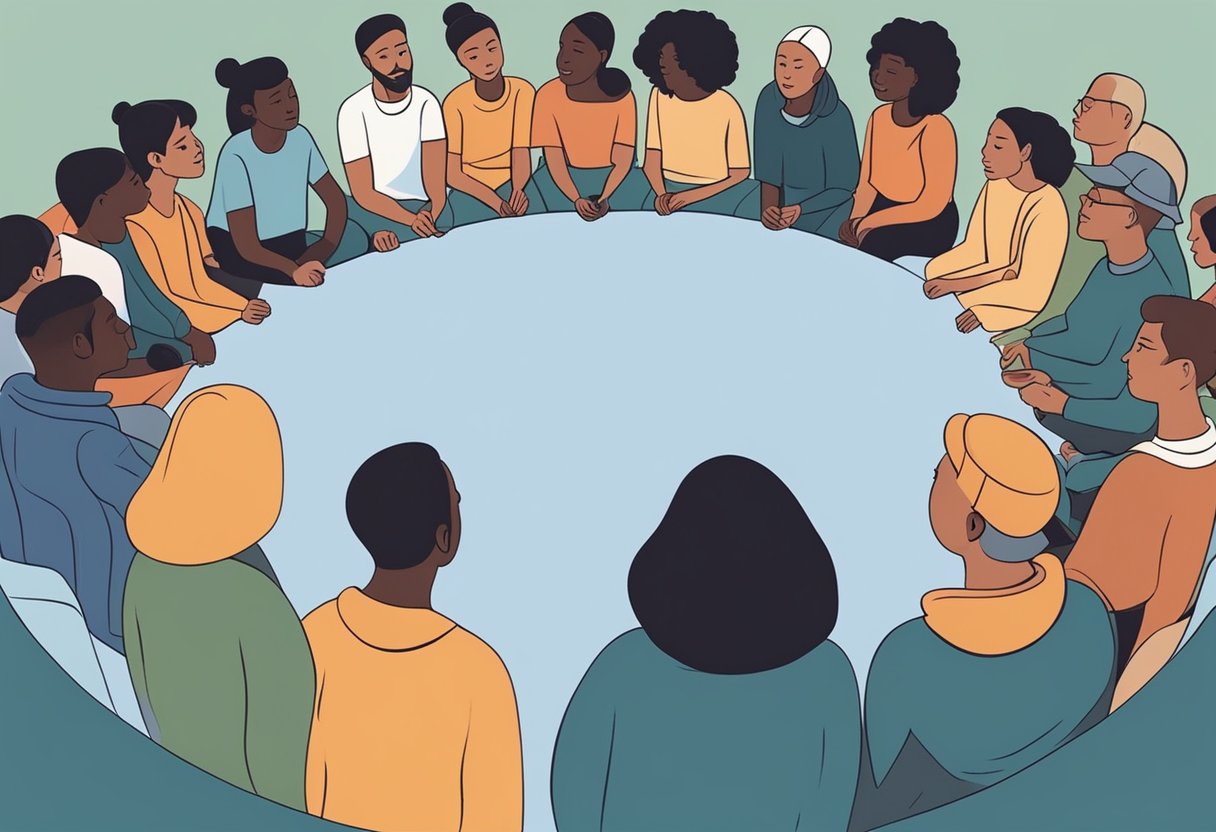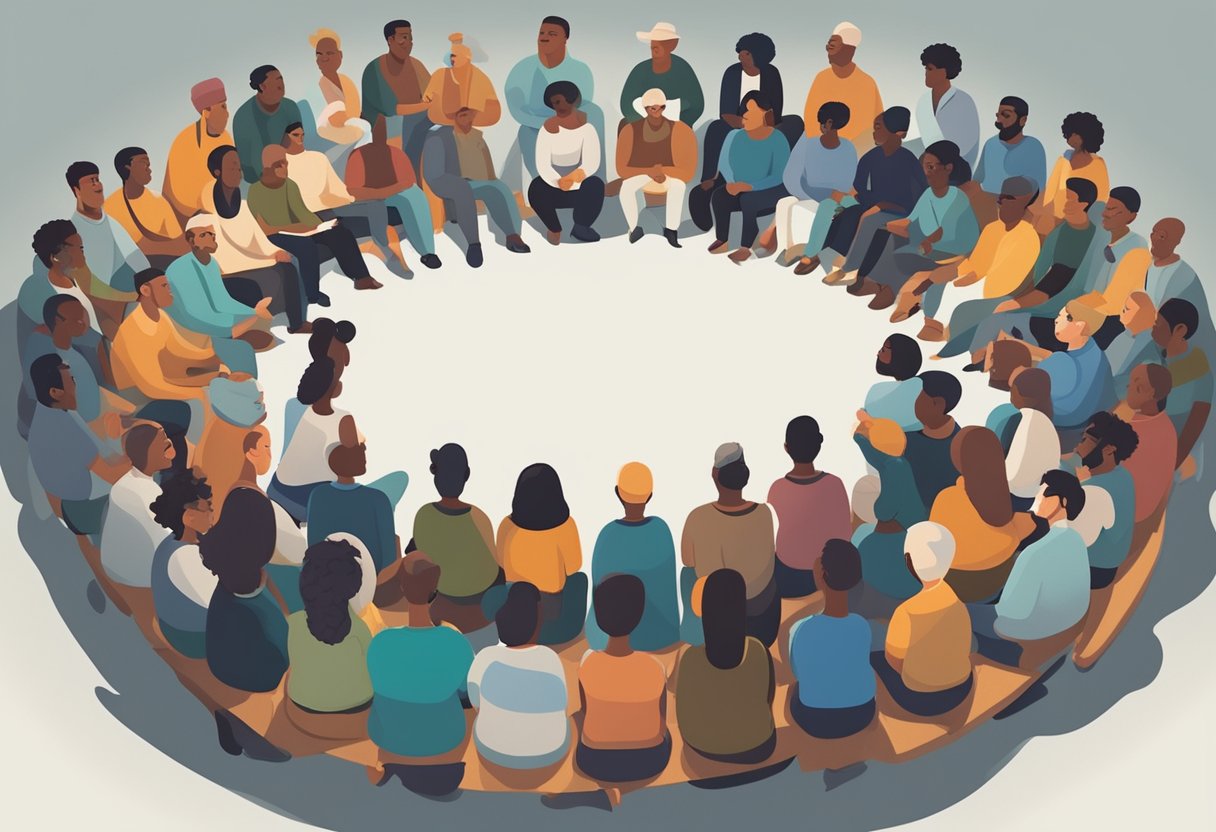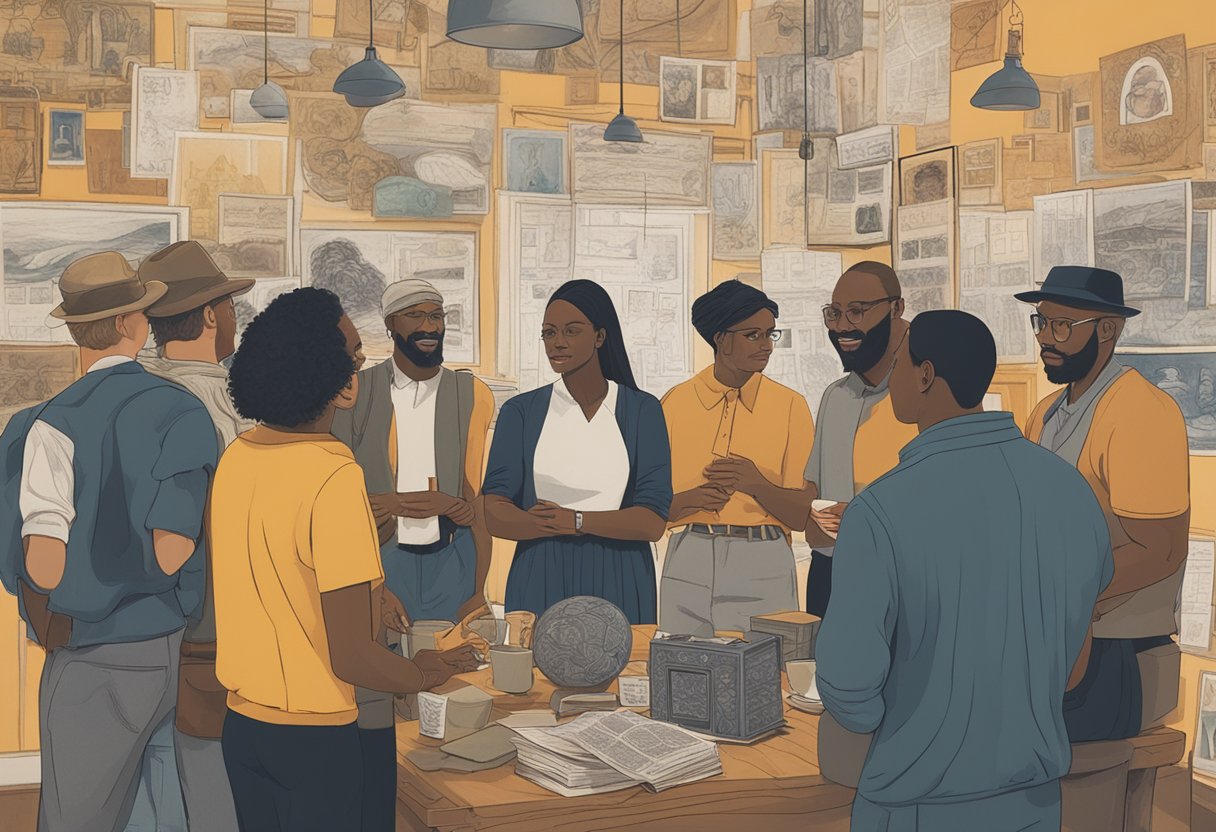Essential Steps for Survivors
We know firsthand the journey of facing cancer can be challenging, especially for men. Our shared experience of surviving lymphoma cancer twice highlighted the critical need to build a reliable support network. Creating a robust support system provides strength and resilience that can significantly impact recovery and well-being.
Whether it’s family, friends, or fellow thrivers, having a network helps navigate treatment challenges and beyond.

Male cancer thrivers often don’t seek out the emotional and practical support available to them. This can make the cancer experience feel isolating. We believe that forming connections with others who understand can be a lifeline.
Connecting with peer mentors, joining support groups, or accessing resources from organizations like the American Cancer Society can make a difference.
Being part of a supportive community is more than just about emotional comfort; it offers practical help too. From managing daily activities to understanding treatment options, a solid support network contributes to living fully beyond cancer.
Through sharing stories and experiences, we can find strength and motivation to not just survive but thrive.
Key Takeaways
- Engage with a strong support network for enhanced resilience.
- Male cancer thrivers need emotional and practical support.
- Peer connections and resources are crucial for thriving.
Understanding Cancer in Men
Men often face unique challenges during their battle against cancer. We need to address these issues to create effective support networks.
The Male Cancer Journey
Navigating the path of cancer can be daunting. Men are often less likely to join support groups and express their emotions. They tend to seek information rather than emotional support. This pattern can leave them feeling isolated.
We should provide platforms for men to share their experiences and feelings. By encouraging open discussions, we can help reduce the shame or fear associated with their diagnosis. Emotional support is just as vital as medical treatment.
Professional-led support groups or online communities can offer a safer environment for expressing fears and apprehensions. Physical activities, like weekly sports games, can also foster a sense of community and shared strength.
Prostate and Blood Cancer Awareness
Prostate cancer is the most common cancer in men in the U.S., aside from skin cancer. It is also the second-leading cause of cancer death after lung cancer. Awareness and early detection are key; about 1 in 8 men will develop prostate cancer in their lifetime.
Regular screenings, like PSA tests, can help detect prostate cancer early. To take proactive steps, it is crucial to stay informed about risk factors, such as age and family history.
Blood cancers, including leukemia and lymphoma, also significantly impact men. They may not receive as much public attention but are equally critical. Early symptoms such as unexplained fatigue or frequent infections should not be ignored.
Building a robust support network involves engaging with healthcare professionals and participating in awareness campaigns. By extending our knowledge and support to men battling these cancers, we empower them to face their journey head-on.
Creating a Solid Support Network
Navigating cancer treatment requires a strong and supportive community. We need the collective support of family, friends, and organized groups to keep us grounded and motivated.
Building Blocks of a Supportive Community
Let’s focus on building a community around us to create a solid support network.
Communication is key; let everyone know what kind of help we need. Whether it’s meals, rides to appointments, or simply someone to talk to, being specific can alleviate stress.
Finding locally-based resources like community centers or groups can also be beneficial. They offer a variety of services, from counseling to physical assistance.
By acknowledging all the support being offered and expressing gratitude, we ensure a lasting and positive relationship with our community. This mutual respect forms the backbone of our network, providing stability during challenging times.
The Role of Family and Friends
Family and friends form the closest rings of our support network. Their involvement can be pivotal in our journey.
They help with daily activities such as cooking and cleaning but also play a critical role in our emotional well-being. Inviting them to doctor appointments helps everyone stay informed and connected.
By being open about our needs and feelings, we can cultivate an environment where our loved ones feel empowered to help. Encouraging them to attend support meetings can also provide them with tools to better support us.
Staying active together, like going for walks or sports, fosters a sense of normalcy and joy. This shared time strengthens bonds, making it easier to face challenges together.
Leveraging Support Groups
Support groups offer camaraderie that friends and family might be unable to provide. Being with others who understand our experiences can be incredibly comforting.
We can share our stories, learn coping strategies, and gain new perspectives by joining a local or online group.
These groups often bring in professionals to talk about managing symptoms, mental health, and navigating healthcare systems.
By participating actively, we can form friendships and find solidarity. This mutual support not only helps in overcoming cancer but also enriches our lives beyond treatment.
Engaging in these groups creates a sense of belonging and fosters an environment of mutual encouragement and hope.
The Emotional Impact of Cancer

Living through cancer challenges us emotionally in ways we may never expect. Men, in particular, often face unique emotional struggles due to personal and societal expectations.
Navigating Complex Emotions
Experiencing cancer shakes the core of who we are. Fear can dominate our minds. We worry about the future and our loved ones. Sadness and anger follow, driven by losing control over our lives. Many men, feeling societal pressure to remain stoic, hide these emotions.
In online cancer support groups, men frequently focus on information rather than sharing feelings. The lack of emotional expression can hinder healing and personal growth.
Professional support groups can help us express these emotions, promoting resilience and peace.
Cultivating a robust support network of friends, family, and professionals helps us manage these intense feelings. Sharing our experiences and listening to others can provide the emotional relief many need.
Tackling Anxiety and Uncertainty
Anxiety and uncertainty often accompany a cancer diagnosis. We question our treatment choices, fearing the possibility of recurrence. Every medical check-up can bring waves of worry. As cancer survivors, managing this anxiety becomes crucial.
Building a strong support network eases this anxiety. Friends and family provide emotional backing. Support groups, both in-person and online, offer a sense of belonging. We connect with those who understand our fears.
Physical activities, such as sports, also reduce anxiety. Engaging in regular workouts can clear our minds and boost our mood. Having a dedicated medical team to trust and rely on is beneficial. They can guide us through medical decisions, alleviating some of our uncertainties.
Together, these strategies help us regain control and foster emotional well-being.
Cancer Resources and Education

Connecting with educational materials and healthcare providers helps us navigate our cancer journey effectively. Staying informed gives us strength and hope.
Educational Materials for Cancer Thrivers
There are various guides and booklets explicitly designed for cancer thrivers. These materials cover topics such as managing side effects, understanding diet and nutrition, and tips for mental well-being.
It’s crucial to use reliable resources from trusted organizations.
Websites like the American Cancer Society offer a wealth of information. They provide free downloads and brochures that can help us make informed decisions.
Accessible, easy-to-read pamphlets can prepare us for what to expect and can be shared with family and friends for additional support.
Professional Support from Healthcare Providers
Collaborating with our oncologists and healthcare providers forms a solid support system. Oncologists can guide us through our treatment plan, help with medication management, and answer any questions.
Regular meetings with a healthcare team ensures our treatments are effective and adjusts based on our progress. They might also connect us with nutritional experts, physical therapists, and mental health professionals.
Seeking professional advice can significantly impact our recovery and overall well-being as we thrive through and beyond our cancer journey.
Healing Through Community and Storytelling

Our shared experiences and the connections we make can greatly aid in our healing journey. Storytelling serves as a powerful tool for fostering community and finding strength.
Sharing Stories of Survival
When we share our stories of survival, we create a bond that connects us on a deep level. This connection provides strength and comfort during tough times.
For example, during my battle with lymphoma, discussing my journey with other survivors helped me feel less isolated.
By recounting our struggles and victories, we not only heal ourselves but also offer hope and encouragement to others.
There’s something incredibly comforting about knowing someone else has walked this path and come out stronger. Encouragement flows naturally when we see that survival is possible.
Gathering in support groups and attending events like Relay for Life can also create a support network that’s irreplaceable.
These gatherings build friendships and a community of understanding. In sharing our stories, we empower one another and foster a collective resilience.
The Power of Blogging
Blogging offers an accessible way to share our experiences and insights. By putting our stories online, we can reach a wider audience and connect with those who may feel alone in their journey.
During my treatment, I found relief and solidarity in reading blogs of other survivors.
Starting a blog can be therapeutic, providing an outlet for expressing emotions and documenting progress.
It’s also a way to educate others about the realities of living with cancer, breaking down misconceptions and spreading awareness.
Moreover, our blogs create a dialogue, inviting readers to share their own stories and support.
This back-and-forth communication strengthens the bond between us and our readers, creating a supportive and informed community.
Engaging in this digital storytelling helps us and others navigate the complex landscape of cancer survival together.
Practical Support Strategies
Practical support for male cancer thrivers involves organizing daily assistance and coordinating caregiver efforts to ensure a balanced and manageable routine.
Organizing Practical Help
Creating a robust support network starts with organizing practical help.
Simple tasks like driving to medical appointments, preparing meals, and managing household chores can become burdensome.
We can enlist the help of friends, family, and community members to share these responsibilities.
Using tools like a shared calendar can make tracking who is helping on which days easier. It ensures no aspect of care is overlooked.
Providing a list of tasks and dividing them among volunteers makes the process efficient.
Having meal schedules can also ease the burden.
A well-planned meal train helps ensure the thriver gets regular, nutritious meals without worrying about cooking.
Family and friends can sign up for specific days to deliver meals, covering breakfast, lunch, and dinner.
Caregiver Coordination
Caregivers play a central role in the cancer journey. Coordinating their efforts ensures they work as a cohesive team.
We can designate a lead caregiver as the point person responsible for tracking appointments, medication schedules, and other critical information.
Regular team meetings among caregivers can help align everyone’s efforts. They provide a space for discussing challenges and adjusting care plans as needed.
Using apps or online tools designed for caregiver management can streamline this process.
These tools allow us to share updates, delegate tasks, and communicate efficiently. With clear coordination, caregivers can provide consistent and reliable support.
Living Beyond Cancer

Living beyond cancer involves making choices that help us thrive and recognizing that each journey is unique and significant. Let’s explore lifestyle options that foster well-being and honor our personal recovery paths.
Thriving as a Lifestyle Choice
Choosing to thrive starts with recognizing the power of our daily decisions.
We can engage in activities that promote physical health, such as regular exercise and balanced nutrition.
Staying active boosts our energy and helps manage stress.
For instance, joining a local sports team or community fitness class fosters physical and social wellness.
Our mental health is equally vital.
We should seek support from others who understand our experiences.
Connecting with cancer support programs provides access to resources and emotional tools that aid our journey.
Whether through counseling, support groups, or one-on-one conversations, these connections reinforce our resilience and determination to live fully.
Honoring Your Unique Journey
As we navigate our paths, we must honor our experiences as we navigate our paths and emotional responses.
Our stories are valuable and deserve recognition. Sharing our experiences with others validates our journey and provides hope and guidance to those facing similar challenges.
Acknowledging our milestones and progress is vital.
Whether celebrating small victories or significant achievements, each step represents our resilience and strength.
Recognizing the unique aspects of our journey fosters a more profound sense of self and empowers us to continue moving forward.
Listening to our bodies and minds ensures we address our needs holistically.
This attentive approach allows us to heal effectively and embrace life beyond cancer with confidence and purpose.
Each choice contributes to our overall well-being and recovery, marking our journey as one of strength and unique honor.
Frequently Asked Questions

Building a support network is crucial for men navigating cancer recovery. Here, we address common concerns and offer actionable advice.
How can a man cope with the emotional impact of cancer diagnosis and treatment?
Dealing with a cancer diagnosis can be overwhelming.
We recommend talking with mental health professionals who specialize in cancer care.
Tapping into mindfulness practices, like meditation or yoga, also provides relief.
Sharing experiences in a support group can help normalize these feelings.
What strategies are effective for men in building a supportive community after a cancer diagnosis?
Creating a supportive community involves reaching out to friends and family and clearly communicating your needs.
Attending local cancer survivor groups or joining online forums can connect us with others who are going through similar experiences.
Engaging in group exercise or hobby clubs also fosters a sense of belonging.
What are some ways to encourage positive communication with family and friends during cancer recovery?
Maintaining open and honest communication helps strengthen bonds during tough times.
Being transparent about our needs and feelings allows our loved ones to support us better.
Setting regular check-ins ensures everyone stays updated and connected.
Practicing active listening when others share their concerns builds mutual understanding.
How does social support contribute to cancer survival and quality of life for men?
Social support significantly boosts our quality of life and chances of survival.
Emotional backing from loved ones can reduce stress and anxiety.
Having people to rely on during treatment motivates us to keep going.
Social interaction also offers practical assistance, like help with daily tasks or attending appointments, easing our burden.
What resources are available to help men connect with others who have faced similar cancer challenges?
Numerous resources exist for connecting with fellow cancer thrivers.
Many hospitals offer specialized support groups, and organizations like the American Cancer Society provide local meeting listings.
Websites like Thrive also have helpful guides and forums for interaction.
What role can online support groups play in assisting men during their cancer journey?
Online support groups play a vital role in our journey. They allow us to share experiences and advice at any time of day.
These groups foster a sense of community and understanding, bridging geographical gaps. Participating in online forums gives us access to broader perspectives and information.
